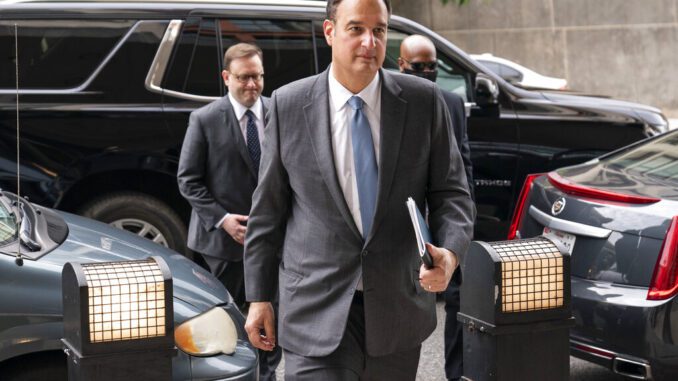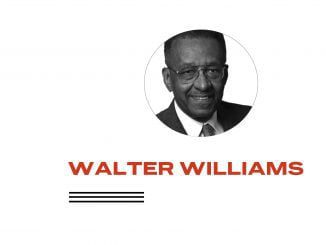
WASHINGTON, D.C. — A lawyer for Hillary Clinton’s 2016 campaign who is charged with lying to the FBI early in the Trump-Russia probe sought to “use and manipulate” federal law enforcement to create an “October surprise” in the final weeks of the presidential race, a prosecutor alleged Tuesday at the start of his trial. Defense lawyers told jurors he never lied.
Michael Sussmann is accused of misleading the FBI during a September 2016 meeting by telling the bureau’s top lawyer that he wasn’t acting on behalf of a particular client when he presented computer data that he said might connect Russia to then-candidate Donald Trump. In reality, prosecutors say, he was acting on behalf of the Clinton campaign and another client who had provided him with the data.
He lied, prosecutor Brittain Shaw told jurors, in hopes of generating an “October surprise” of FBI investigations into Trump and negative news coverage of him, and because he knew the FBI would consider the information less credible if it thought it was being presented on behalf of the Clinton campaign.
“He told a lie that was designed to achieve a political end, a lie that was designed to inject the FBI into a presidential election,” said prosecutor Brittain Shaw.
But Sussmann’s lawyers sought to counter each of the prosecution’s allegations, portraying him as a well-respected attorney with deep experience in law enforcement and cybersecurity matters who would never lie to the FBI. The fact that he represented Democratic clients was well-known to the FBI and not anything he intended to hide, they said.
Sussmann’s trial is the first arising from special counsel John Durham’s investigation into the FBI’s original probe into Russian election interference and potential ties with the Trump campaign. In an early recognition of the politically loaded nature of the case, Shaw urged jurors to put aside any feelings they might have about Trump, Russia or Clinton.
“Some people have very strong feelings about politics and Russia, and many people have strong feelings about Donald Trump and Russia. But we are not here because these allegations involve either of them, nor are we here because the client was the Hillary Clinton campaign,” Shaw said.
At issue is a Sept. 19, 2016 meeting in which Sussmann presented Baker, the FBI’s then general counsel, with computer data gathered by another of his clients that purported to show furtive contact between computer servers of the Trump Organization and Russia-based Alfa Bank. That connection, if true, would have been explosive at a time when the FBI was examining whether the Trump campaign and Russia were conspiring to sway the election.
The FBI investigated the data but quickly ruled out anything suspicious or nefarious. The internet activity instead reflected what Shaw described as a “spam email server” used to send out marketing.
“The server did not reflect a crime,” Shaw told jurors, “nor was it a threat to national security.”
Under a prosecutor’s questioning, he said that knowing where the information came from and who it was provided by would have been a key “data point” in assessing its credibility, though he said he likely would have done the technical analysis no matter what.
Durham was appointed in 2019 by then-Attorney General William Barr to look for any misconduct as the U.S. government was examining potential coordination between Russia and the 2016 Trump campaign. An investigation by an earlier special counsel, Robert Mueller, did not find a criminal conspiracy between Russia and the Trump campaign.


